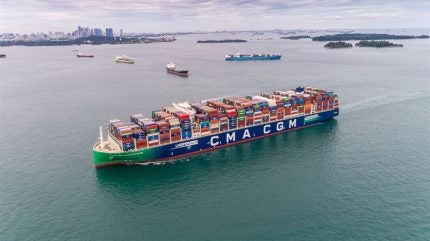
Wärtsilä, a global technology group, has signed an agreement to enhance the operational reliability of 14 LNG-fuelled container ships for CMA Ships, part of the French shipping giant CMA CGM.
The lifecycle agreement aims to optimise maintenance and operations for the vessels, ensure the reliability of vessel operations while offering flexible maintenance planning and long-term cost predictability.
The agreement covers five 15,000 TEU ships and nine 23,000 TEU ships, which operate between Asia and Europe.
These ships are equipped with WinGD two-stroke main engines, Wärtsilä four-stroke auxiliary engines, and gas valve units.
CMA CGM newbuilding vice-president Xavier Leclercq said: “The management of new fuels such as LNG can be complex and costly. This agreement with Wärtsilä will help us secure ship operations and optimise engine maintenance costs.
“We appreciate the cooperation and support that Wärtsilä continues to provide us in meeting our customer needs as effectively as possible.”
Wärtsilä will deliver a comprehensive service package that includes predictive maintenance through its Expert Insight service, which utilises AI technology to enhance asset efficiency and reduce operating costs.
The package also encompasses parts and maintenance services, dynamic maintenance planning, and round-the-clock remote operational support.
Wärtsilä Marine performance services vice-president Andrea Morgante said: “Our partnership with CMA CGM has been long and mutually successful and we are pleased to continue it with this new agreement.
“CMA CGM are well known for delivering reliable, flexible and sustainable shipping services around the globe. It’s why this agreement has been tailored to meet their specific needs, giving them the peace of mind that their ships will continue to meet customer expectations.”
Last month, Sallaum Lines selected Wärtsilä to upgrade three of its pure car/truck carrier vessels with Wärtsilä EnergoFlow solution and Fixed Pitch Propellers as part of its decarbonisation efforts. The upgrades are expected to enhance propulsion efficiency, reduce fuel consumption, and lower CO2 emissions.



